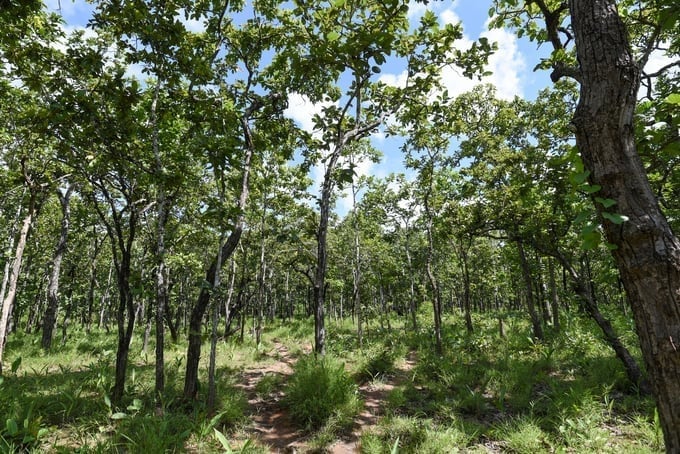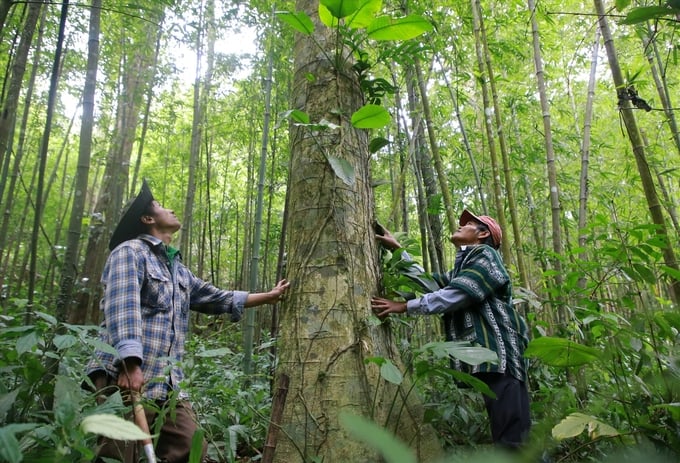June 19, 2025 | 18:21 GMT +7
June 19, 2025 | 18:21 GMT +7
Hotline: 0913.378.918
June 19, 2025 | 18:21 GMT +7
Hotline: 0913.378.918

Vietnam has significant potential to develop the carbon credit market. Photo: Tung Dinh.
In accordance with its pledge to achieve net zero emissions by 2050 at the 26th Conference of the Parties (COP26) to the United Nations Framework Convention on Climate Change, Vietnam has updated its Nationally Determined Contribution (NDC), detailing international commitments to emission reduction.
The implementation of the NDC is a nation's responsibility to fulfill the United Nations Framework Convention and the Paris Agreement on climate change, which includes targets for reducing greenhouse gas emissions in energy, agriculture, land use and forestry; and managing waste and industrial processes.
With the aim of fulfilling the emission reduction commitments by 2030 under the NDC and achieving net zero emissions by 2050, the Prime Minister emphasized the urgency of formulating and implementing greenhouse gas emission reduction plans across sectors; developing the carbon market; and establishing mechanisms for managing carbon credits.
According to the Prime Minister, the development of the carbon market and related management, exchange, and offset mechanisms are essential solutions to achieving greenhouse gas emission reduction goals at reasonable costs, promoting the development and application of low-emission technologies, enhancing the competitiveness of businesses, increasing incomes for participants of greenhouse gas emission reduction projects, and protecting and developing forests.
During the early 2000s, Vietnamese businesses have actively implemented programs and projects to generate carbon credits; and subsequently exchanging them on the global voluntary markets. During this period, projects funded by the Clean Development Mechanism (CDM) produced the majority of the carbon credits.
However, there has been a lack of comprehensive and accurate public information regarding the carbon market and its credit management mechanisms over the years. This limitation is dominant in information pertaining to credit management and generation from forests and other sectors. As a result, organizations, businesses, and individuals have failed to fully understand the carbon market and the procedures for generating carbon credits for market transactions.
The Prime Minister's instructions on carbon credit management involve the development and implementation of regulations on management mechanisms for carbon credit generation, exchange, and trading. Namely, transactions to offset greenhouse gas emission quotas or voluntary transactions are subject to these regulations. Furthermore, the regulations will act as a foundation for the development of domestic carbon credit market, as well as Vietnam's participation in the global carbon credit market.
The exchange and trading of carbon credits, along with the reduction in greenhouse gas emissions, must fulfill the national greenhouse gas emission reduction targets. It is crucial to maintain a balance between the interests of the state and those of citizens, businesses, and participating partners.

The Ministry of Finance is tasked with leading the development of the project. Photo: Tung Dinh.
In order to strengthen carbon credit management and promote carbon credit market development, thereby ensuring implementation of the NDC and balancing the interests of the state, businesses, citizens, and participating partners, the Prime Minister issued Directive No. 13/CT-TTg on May 2nd. Accordingly, the directive emphasizes the importance of providing accurate and comprehensive information regarding the carbon credit market and carbon credit generation procedures.
Under this directive, the Ministry of Finance is tasked with leading the Carbon Credit Market Development Project in Vietnam in coordination with the Ministry of Natural Resources and Environment and relevant units. Participants of the project must focus on achieving the stated objectives for pilot and official operations; studying and evaluating the experiences of regional and international countries in the construction, management, operation, and development of the carbon credit market. Subsequently, the project will be submitted for approval by competent authorities.
Additionally, the Ministry of Industry and Trade, Ministry of Transport, Ministry of Construction, Ministry of Agriculture and Rural Development, and Ministry of Natural Resources and Environment are tasked with issuing plans to reduce greenhouse gas emissions in their respective sectors in compliance with the Government's Decree No. 06/2022/ND-CP, and implementing these plans to fulfill NDC commitments. These tasks must be completed by the third quarter of 2024.
Participating Ministries also responsible for providing consultations for competent authorities on negotiating, signing, and implementing international agreements or contracts regarding the transfer of carbon credits and results of greenhouse gas emission reductions. This task is aimed at ensuring the achievement of emission reduction targets under the NDC. Additionally, they must assess different sectors' capacity to participate in the carbon credit market.
The Ministry of Natural Resources and Environment is tasked with studying the establishment of a national registration system for carbon credits. The Ministry is also responsible for managing programs, projects, and activities aimed at reducing greenhouse gas emissions and generating carbon credits. These initiatives are essential for implementing pilot projects, developing the domestic carbon credit market, and participating in international carbon credit exchanges.
Additionally, the Ministry of Natural Resources and Environment has been requested to promptly draft amendments and supplements to the Government's Decree No. 06/2022/ND-CP. These revisions will include regulations on managing carbon credits as well as domestic and international carbon credit exchanges. The Ministry is required to submit these proposals to the Government before July 30, 2024.
The Ministry of Agriculture and Rural Development will be responsible for coordinating with the Ministry of Natural Resources and Environment and local governments in forested areas, to establish a national, regional, and local database for greenhouse gas emissions reduction and forest carbon sequestration by 2030, with preparations until 2050.
Moreover, the Ministry of Agriculture and Rural Development has been requested to establish national standards for forest carbon credits, and detailed regulations for measuring, reporting, and verifying forest carbon sequestration; develop pilot policies and payment mechanisms for carbon credits based on the performance of high-quality and low-emission specialized rice production areas.
The Ministry of Industry and Trade is responsible for reviewing the legal framework, national background, and international experience regarding renewable energy certificate management in association with national emission reduction goals. Consequently, the Ministry of Industry and Trade is required to propose management regulations to the Prime Minister by September 30, 2024.
Provincial People's Committees nationwide must coordinate with relevant ministries and sectors to fulfill national greenhouse gas emission reduction targets under the NDC; review and evaluate current activities and measures aimed at reducing greenhouse gas emissions within their jurisdiction, thereby assessing the potential for carbon credit generation and exchange.
Furthermore, Provincial People's Committees have been assigned the responsibility of examining and requesting detailed project information, including the quantity of carbon credits generated and exchanged, from local businesses and organizations that are implementing projects under the carbon credit exchange and offset mechanism.
Translated by Nguyen Hai Long

(VAN) The waste of resources from agricultural by-products and the situation of counterfeit and poor quality goods in production causing losses of thousands of billions were pointed out by the National Assembly deputy.

(VAN) After 5 years of implementation, the CAI initiative has helped coffee growers change their farming practices, moving toward responsible agriculture that meets global export standards.

(VAN) The primary prerequisite for the comprehensive and robust integration of Vietnam's livestock sector into the global value chain is the establishment of a disease control system.

(VAN) The results of national programs are essential for establishing a contemporary livestock sector that is well-equipped to meet the demands of both domestic and international markets, with robust biosafety standards.

(VAN) The UNESCO Global Geopark revalidation of Non nuoc Cao Bang and the transition to a two-tier administrative model are presently undergoing a pivotal moment in Cao Bang, the northernmost province of Vietnam.
/2025/06/13/5330-2-004539_953.jpg)
(VAN) Changing policy mindset and removing investment barriers are urgent requirements to open up new development space for enterprises in the agricultural sector.

(VAN) The areas include the restoration of five million hectares of marine ecosystems.